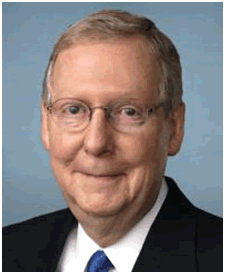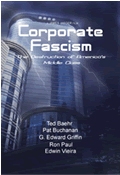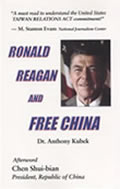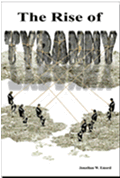REPUBLICANS PUSHING TRADE BILL THAT HANDS POWER TO OBAMA, VOTE EXPECTED FRIDAY
 By
NWV News writer Sarah Foster
By
NWV News writer Sarah Foster
Posted 1:00 PM Pacific
June 11, 2015
� 2015 NewsWithViews.com
Washington DC . —On May 22, the Senate reauthorized Trade Promotion Authority legislation (also called “Fast Track”), in a roll call vote of 62-37, sending the bill to the House for further action. Proponents are hoping for a vote before the weekend. The measure is supported by Obama, much of the House Republican Conference, and 19 Democrats.
 Sen.
Mitch McConnell
Sen.
Mitch McConnell
With just five Republicans voting No, it was a major victory not only for the president, but for Senate Majority Leader Mitch McConnell (R-Ky.), who stated in April that passing this and a series of trade bills would be the 114th Congress’s biggest accomplishment. Although a number of Republicans were at first strongly opposed, in the final count only five voted against the bill.
Now it’s Speaker John Boehner (R-Ohio) and Rep. Paul Ryan’s (R-Wis.) turn to do the arm-twisting on the House side, where Democrats are generally opposed as are many Republicans. The grassroots opposition has intensified in the past few months, and includes groups ranging in political persuasion from the John Birch Society, Eagle Forum (two organizations that took a strong stand against NAFTA) and various Tea Parties, like Tea Party Nation, to the AFL-CIO, Code Pink, Public Citizen, and a host of environmental groups.
 Speaker
John Boehner
Speaker
John Boehner
Representatives Boehner and Ryan are determined to do whatever it takes to ram the Trade Promotion Authority bill though the House, thereby clearing the way for quick and easy passage of the massive 12-nation Trans-Pacific Partnership Agreement (TPP) and other contentious “free trade” agreements which the president’s trade office is currently negotiating – treaties made all the more contentious by being kept “Top Secret” and classified “Confidential.”
Actually, they aren’t completely secret. Although the general public and their elected officials in Congress and their staffs have been denied access to see and study them, representatives of multi-national corporations that are helping craft the chapters with the Office of the Trade Representative have full access.
What Fast Track Means
Under Fast Track, Congress can either approve or reject trade deals presented by the president, but will not be permitted to suggest amendments. The amount of time allowed to review and analyze an agreement is limited, as is the time allotted for debate. In the Senate, passage would be by simple-majority, instead of the 60 votes required for controversial legislation. Basically, it’s yes or no, up or down.
Supporters of Fast Track insist these provisions are necessary to keep trade deals from being bogged down by amendments and discussion, which could happen, especially when an agreement is particularly unpopular, like the TPP.
Boehner, Ryan and other GOP representatives and senators are working hand-in-hand with Obama and his administration, in a joint-effort to give the president the power to act unilaterally on trade treaties, a power that amounts to a blank check on trade treaty making. And the TPA would be in effect for six years, plenty of time for the next president – whoever he or she will be -- to approve them all, with token input from the Congress.
Which is why critics – and there are many, including most Democrats in Congress -- maintain the real intention is to give more power to the president and to weaken Congress. They wonder why the Republican leadership in particular is so willing to transfer power assigned by the U.S. Constitution from the Legislative Branch to the Executive, why they would agree to treaties they have not even seen.
None of it makes sense, particularly to those working to defeat Fast Track and who are watching the process close up and personal, activists like Crista Huff, a retired stock broker in Colorado who describes herself as a Republican, Tea Party activist and patriot.
Since
January, Huff has traveled to Washington on a regular basis to work
with End
Global Governance, a non-profit D.C.-based group, described on its
website as “a coalition of liberty and patriot organizations working
to protect American sovereignty from global governance treaties, bad
trade agreements and multinational institutions.”
 Huff
has talked to dozens, perhaps hundreds, of staffers and legislators,
but says she is in the dark as to Republican motivations. Representatives
are being swamped with e-mails and faxes and phone calls mostly in opposition,
and while the Leadership ignores their concerns the members do not.
Huff
has talked to dozens, perhaps hundreds, of staffers and legislators,
but says she is in the dark as to Republican motivations. Representatives
are being swamped with e-mails and faxes and phone calls mostly in opposition,
and while the Leadership ignores their concerns the members do not.
“I still don't know why the GOP is trying to enable Obamatrade,” Huff writes in an e-mail. “Boehner and Ryan will hold a vote Thursday, June 11th if they get a few more congressmen to support Obamatrade. We know from Congressional office visits that most constituent calls are saying ‘no on fast track’. So your calls DO MAKE A DIFFERENCE.”
[Note: The vote has been postponed to Friday]
“Obama is pulling out all the stops to get the votes,” she says. “He is inviting Democratic congressmen to fly with him on Air Force One. He is involving cabinet members in advocacy. The Obamatrade effort is as strong as the Obamacare effort,”
The president’s actions are not surprising. He’s trying to persuade the Democrats in Congress to give him excessive authority, and the rank-and-file members of his party don’t want to give it to him or to any president.
Trans-Pacific Partnership
Although the Trade Promotion Authority requires immediate attention, it is the prelude to a host of treaties, all of which pose a threat to national sovereignty and all are being kept secret. Besides the Trans-Pacific Partnership Agreement, waiting in the wings are the Transatlantic Trade and Investment Partnership (TTIP), and a new creation, the Trade In Services Agreement (TISA). If TPA is in effect, Congress will have no say in how any of these are drafted and finalized.
These trade pacts are especially controversial because they are so broad-reaching, and include chapters on patents, copyright, financial regulation, energy, food safety, healthcare and more.
So in addition to trying to stop the TPA, Huff with other End Global Governance activists have been lobbying against the Trans-Pacific Partnership Agreement, a treaty described by critics as “NAFTA on Steroids.” It is an agreement between 12 nations of the Pacific Rim: Canada, Mexico, Peru, Chile, Australia, New Zealand, Brunei, Singapore, Malaysia, Japan, Vietnam, and the United States.
China is not a party to the TPP, a situation sure to be remedied by Obama once he has the power he craves. Under provisions of the TPA, the president will have the unilateral authority to bring China into the Partnership without troubling Congress with details.
Investor-State Dispute Settlement (ISDS)
In a letter published in The Colorado Statesman, Huff focused on a TPP provision under which foreign and multi-national corporations (both private and state-owned) would have the legal power to sue not only the federal government (a power they already have), but state and local governments as well.
The TPP also gives global courts (tribunals) authority to override federal, state, and local laws, and to award large sums of money to foreign interests, for such nebulous claims as their “profit expectations” were not met.
These provisions, found in the Trade and Investment Chapter, have only recently been made public – not because it was released by the government, but because it was outed by WikiLeaks in March. In fact, were it not for WikiLeaks, we’d know almost nothing about this agreement or the others.
“That lawsuit provision, referred to as the Investor-State Dispute Settlement (ISDS) already exists in previous trade deals, such as NAFTA,” Huff writes.
“What’s new in the TPP is the provision for those foreign entities to directly sue U.S. states and municipalities (counties, towns, ports, etc.) in global courts, entirely bypassing U.S. court systems, and trashing the concept of U.S. sovereignty.“We already know, from witnessing ISDS lawsuits under NAFTA, that many of these lawsuits are frivolous, many of their outcomes are clearly unjust, and the mere cost of combatting such a lawsuit in global court could cost a town millions of dollar — dollars that they can ill-afford to spend.
“Our states and municipalities do not have the manpower, let alone the expertise, to argue cases in global courts. And the court system itself is somewhat of a farce. These secret global tribunals are made up of three attorneys who take turns acting as judge and prosecutor. When acting as judge on a current trial, they can make a ruling that becomes a new part of the TPP, thereby favorably affecting the outcome of the next case which they’ll be prosecuting, a few months hence.
“Yes, these rulings change and add to the Trans Pacific Partnership. And the defendants have no opportunity to appeal the rulings”
ISDS, Huff continues, has the potential to turn Colorado cities and towns into “Detroit-like wastelands after just one loss in global court.”
“What happens when a $300 million judgement is levied against Denver County? She asks. “If the money is not in the county’s bank account, what does the global court take? Our museums? Our parks? Our land?”.
Contacted for further comment, Huff characterized the ISDS provision, as “absolutely stunning.”
|
|
“You could bankrupt any municipality with the loss of one lawsuit in global court,” she exclaimed. “And here’s something even more stunning: Just the mere act of going to global court could bankrupt a municipality, even if they win the lawsuit. Imagine the millions of dollars it takes to go to global court. Now just imagine all of the places where you live, the places where you grew up. Which of these places has several million extra dollars in their budget? None of them. Unless you came from place like Chicago, your city does not have millions of dollars to spend on frivolous lawsuits.”
Huff added that although this provision by itself is for her a top reason to opposing the TPP and the TPA, it’s not the only one, and several have been listed on the End Global Governance website.
“There are many reasons to oppose to oppose the TPP – this trade deal is horrible across the board,” she said.
Selected Earlier Stories
1
- Devvy Kidd: Boehner
and McConnell Working to Kill Off America As We Know It: TPP. May
11, 2015
2 - Devvy Kidd: It's
War: Stop the TPP and TAFTA. Jan. 26, 2014
3 - Scott Tips: The
Flattening Forces of Globalization Continue to Advance. Sept. 14,
2014
4 - Scott Tips: The
TransPacific Slam Job. Sept. 16, 2012
More Reading / Sources
•
Crista Huff: Letter:
Another Reason to Oppose TPP. The Colorado Statesman, Apr. 26, 2015
• Wm. Jasper: Seven
Reasons Why Trade Promotion Authoity/Fast Track Must Be Defeated.
The New American, June 5, 2015
• Wm. Jasper: 10
Reasons Why You Should Oppose TPP and TTIP. The New American, June
5, 2015
• Wm. Jasper: TISA
Leaks: Another Secret Obamatrade Deal, More Reasons to Stop "Fast
Track". The New American, June 5, 2015
• Wm. Jasper: "Living,"
"Evolving" Dangers are Hidden in ObamaTrade (TPP & TTIP).
The New American, May 18, 2015
Judson Phillips: Trade and the Tea Party: Washington Insiders Remain Clueless. The Hill, Feb. 24, 2014. Phillips is president of Tea Party Nation.
Office of the U.S. Trade Representative: Trade Promotion Authority.
Check also the excellent analyses by Public Citizen.
� 2015 NewsWithViews.com - All Rights Reserved












 Share
This Article
Share
This Article




